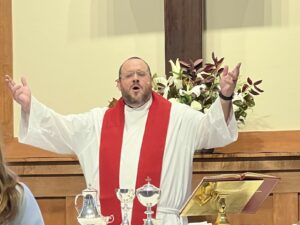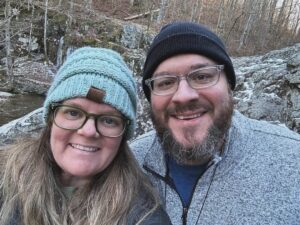Ryland+ Brown: Serving With a Global and Historical Perspective
AMIA Communications
 “Everybody is able to minister within the church, but you’re set apart for a specific function within the life of the church.” That’s how Ryland+ Brown describes the role of priest in the AMiA. And though his path to priesthood involved discovering a new global and historical perspective of his faith, he’s quick to emphasize, “I’m still learning and growing, and I hope that never stops.”
“Everybody is able to minister within the church, but you’re set apart for a specific function within the life of the church.” That’s how Ryland+ Brown describes the role of priest in the AMiA. And though his path to priesthood involved discovering a new global and historical perspective of his faith, he’s quick to emphasize, “I’m still learning and growing, and I hope that never stops.”
Ryland+ grew up as a preacher’s kid in St. Louis, Missouri, in a group of churches known as Independent Christian Churches, which are part of the Restoration Movement. “From a young age, I felt a call to preach,” he recalls. “I absolutely loved the local church.”
After majoring in Bible and preaching at Johnson Bible College (now Johnson University), he entered full-time ministry in western Kentucky. There he met his wife, Deborah, and they married in 2006. In the years that followed, they welcomed three girls, and he served in several preaching minister roles. After six years at Sturgis First Christian Church, he spent eight years in ministry at Blue Ridge Christian Church, just outside of Asheville. Then, the family moved to Little Rock, Arkansas, where he served at the Little Rock Church.
“In that time began my road to Anglicanism,” Ryland+ recalls. “The reason I came to Anglicanism was really the Book of Common Prayer and this connection to the larger Christian world.”
It was 2021, and Ryland+ had just taken a job at Logos Bible software. He and Deborah were looking for a new church, and St. Andrew’s Little Rock was the first church they visited. As he recalls, “We both got in the car after the service, and we said this was home.”
Though “home” was different from the independent churches he’d been part of to that point, “When we discovered it and started to participate in the life of the church and the sacramental nature of the church and the church calendar … that became life-giving,” Ryland+ recalls. “It was really the prayer life of the church, the creeds, that the Anglicanism at its core is a very simple Christianity, that it doesn’t have to be complex, and it’s grounded in scripture.”
 He found that Anglicanism “was grounded in history, grounded in the Word, but also had a strong Trinitarian theology. I grew up in a context that did not have that strong Trinitarian focus. And so, I just fell in love.”
He found that Anglicanism “was grounded in history, grounded in the Word, but also had a strong Trinitarian theology. I grew up in a context that did not have that strong Trinitarian focus. And so, I just fell in love.”
In Anglicanism, Ryland+ found a stability he hadn’t previously experienced as well as “a global perspective that we’re connected to something larger than ourselves.” As he explains, faith isn’t practiced in isolation. “It’s not just me and Scripture. It’s really the Church moving together. So for us, Anglicanism became a lifeblood and reinvigorated my faith. I had to relearn how to pray and to let the life of Christ that’s reflected in the Church seasons model become a model for my faith and my life.”
Soon after joining St. Andrew’s, Ryland+ talked to the church’s rector, +Robert Cook, about the ordination process in the AMiA. He had previously been ordained in an Independent Christian Church, and found that ordination in the AMiA was more extensive, involving a discernment and vetting process, as well as counseling for him and his wife. It also involved essays as well as exams he estimates took 12 hours to complete—an arduous process, but one he calls “a rich experience.” As he explains, “It is needed. It makes sure you have a sure historical theological perspective of the church and that the issues we face today are nothing new. [It also gives you the] opportunity to see yourself in line with the Church instead of trying to reinvent the wheel.”
As Ryland+ explains, this process looks different from person to person. One particularly impactful part of his path to priesthood was discovering the Church’s history—something that hadn’t been a big part of the church traditions he’d been part of to that point.
In addition to the benefits of a historical perspective, Ryland+ has appreciated the diversity within Anglicanism. “As long as you stay in the boundaries of the creeds and Scriptural foundation, there’s a lot of variance within Anglicanism. … I just have found it wonderful that there can be a variety of opinions about different issues. And that’s not the thing that binds us. It’s the prayer life of the church. Secondary issues get to be secondary, and at the core to be saved by faith through the work of Christ is the primary.”
As Ryland+ explains, day-to-day ministry looks different for different priests. Though many priests in the AMiA serve on staff in local churches, Ryland+ currently works in hospice and serves in a non-staff capacity as needed at St. Andrew’s—for example, visiting homebound members, teaching classes and helping on the pastoral care team.
The biggest change in his ministry is that he’s now able to participate in the sacramental life of the church. “Every day is different,” he says. “I joke about it, but I love to serve in ‘other duties as assigned.’” Ryland+ takes joy in serving as the local church needs and being connected to the larger Church. “Wherever I can be faithful to the Lord, that is where I want to be.”
He encourages those considering ordination or starting on that path to keep a humble posture, stay connected to leaders and not rush the process. “I think it’s a good process because it’s not an easy process,” Ryland+ explains. “It’s not an overnight thing. … It takes as long as it takes. … Allow God to reveal things to you.”
He also offers a caution, especially for those coming from other Christian traditions: “Don’t come to Anglicanism or the ordination in order to run away from your previous experience.” He emphasizes the need to be in a healthy place before pursuing ordination. “Don’t use the ordination process as an opportunity for healing. … Make sure your heart is right.”
He adds, “Be comfortable with people above you … that you don’t have to have the final say. Listen more than you speak and try to find the rhythm: the rhythm of the church life that gives you new life.”

Category: Anglicanism, Leadership, Personal Story
Tags: clergy, ordination, Ordination and Leadership, priest










